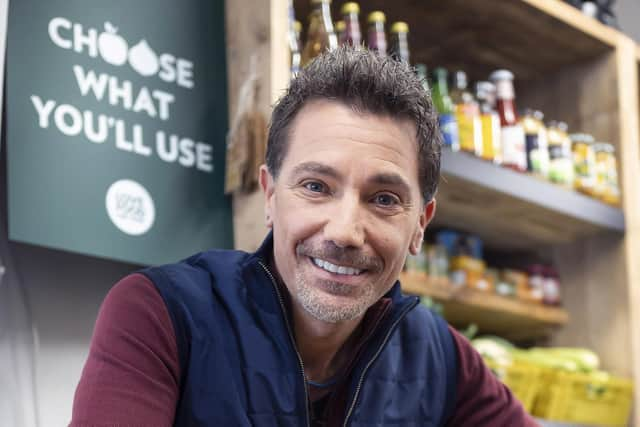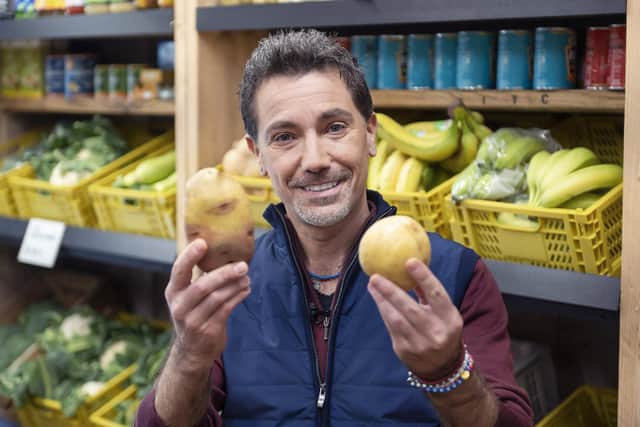Gino D’Acampo: Love Food Hate Waste campaign backed by television chef
After over 30 years in the UK, there’s something Gino D’Acampo can’t get used to: the food waste. “We are used to going to the supermarket and going to places to buy our food – to touch it, to smell it,” the TV chef says of his hometown in Naples, Italy.
“In the last 30 years that I’ve been here, I’ve always been thinking: why do these people buy everything in a plastic bag? Why do they buy so much stuff they don’t need?”
Advertisement
Hide AdAdvertisement
Hide AdFor D’Acampo – who is a regular face on This Morning and fronts Gordon, Gino And Fred: Road Trip alongside Gordon Ramsay and Fred Sirieix – it’s “crazy” to buy your fruit and vegetables wrapped up in plastic.


“It’s crazy to think that anyone would go and buy a bag of peppers, without touching them, without smelling them – and without even thinking what they’re going to do with these backup peppers.
“The majority of people need one or two peppers, but they go into the supermarket, they go into the corner shop and they pick up a bag where there are seven, eight peppers. They use three and then they throw away six.
“I’m thinking: do you really know what you’re doing here? Do you know how much money you’re wasting?”
Advertisement
Hide AdAdvertisement
Hide AdD’Acampo, 47, isn’t one to hide his feelings, and his outrage about food waste is clear – which is why he’s teamed up with Love Food Hate Waste, encouraging people to buy loose fruit and veg.


According to Love Food Hate Waste, 60 per cent of food waste comes from UK homes, which results in 18 million tonnes of CO2. It suggests that the average household of four is wasting the equivalent of £1,000 per year on food that ends up in the bin.
“And yet, we have people in the world who are dying of starvation… How wrong are we? Sometimes you just need someone like me to slap you in the face and go: wakey, wakey! Don’t you see what you’re doing?” D’Acampo says.
“It’s insane to throw all this food away – I think it’s a crime to humans, to humanity, to do what we do.”
Advertisement
Hide AdAdvertisement
Hide AdAnd according to D’Acampo, the problem is getting “100 per cent worse”.
“In the shops, every single thing that you buy is wrapped in plastic,” he says. “Where is the excitement, the spirit of smelling an apple or an orange?”
For D’Acampo, the issue isn’t just food waste – but home cooks could benefit from paying a bit more attention to the fruit and veg they buy.
Advertisement
Hide AdAdvertisement
Hide Ad“That’s another thing people don’t understand – I always tell them 50 per cent of the job when you cook is about buying, it’s not about cooking. If you buy the right ingredients, you’re 50 per cent there, and the food is going to taste much, much better.”
D’Acampo’s strong opinions around food waste stem from his upbringing.
“I didn’t have a family with money, I was brought up on a farm,” he says.
“For me, it’s normal… In my house growing up, there was no throwing stuff in the bin.
Advertisement
Hide AdAdvertisement
Hide Ad"There was no buying things unless you really needed them. So in my mind, it’s always like: OK, what do I need to do to make sure this doesn’t happen?
"I want my family, my children, everybody to understand the amount of food the we are wasting.”
So what can you do to minimise waste in the kitchen? Buying loose fruit and veg is a start, so you only have what you need.
D’Acampo’s adds: “The best thing that anyone who is in the kitchen [can do] is to learn recipes that you can use leftovers [in].
Advertisement
Hide AdAdvertisement
Hide Ad“Let me give you an example from yesterday: we had lunch, a lot of roasted vegetables, roasted chicken… Usually, what do you do with the leftovers? You’re going to throw them in the bin, or you’re going to give it to your dogs if you have animals.
“Or, you’re going to come up with something that you can use that with. There are so many recipes, like risotto or a frittata – like a big omelette.
"That’s what I did yesterday, I got old roast potato, vegetables, everything else, [and I thought] I’m going to make a lovely frittata. Because the flavours are already in the vegetables, the flavours are already in the potato – it’s only the technique of putting the eggs together and there’ll be Parmesan cheese on top, then the job was done.”
If you think you’re too busy to go to the supermarket or greengrocer to pick out individual veg, D’Acampo has an answer for that too.
Advertisement
Hide AdAdvertisement
Hide Ad“Yes, yes, yes – but you do have the time to go on social media. You do have the time to mess around watching a series on Netflix, movies and stuff like that. You do have the time for drinking in the pub, you do have the time to do millions of other things – but yet you don’t have the time to feed yourself properly.”
For D’Acampo, who has a restaurant under his own name in Leeds, West Yorkshire, it speaks to a wider issue about the food ethos in this country.
“It’s like driving a Ferrari and putting the (worst) petrol you can think of in your car. What’s the point? You have your beautiful car, but when it comes to putting petrol in it, you’re going to choose the cheapest petrol you can get. That doesn’t work, does it?”
Love Food Hate Waste is run by the international climate action charity, Waste and Resources Action programme (WRAP). It has been spreading the word about food waste in homes and how to fight it since 2007.
It offers recipes, tips for food savings and weekly routines, resources for schools and much more.
Find out more on the Love Food Hate Waste website: lovefoodhatewaste.com/fwaw
Comment Guidelines
National World encourages reader discussion on our stories. User feedback, insights and back-and-forth exchanges add a rich layer of context to reporting. Please review our Community Guidelines before commenting.